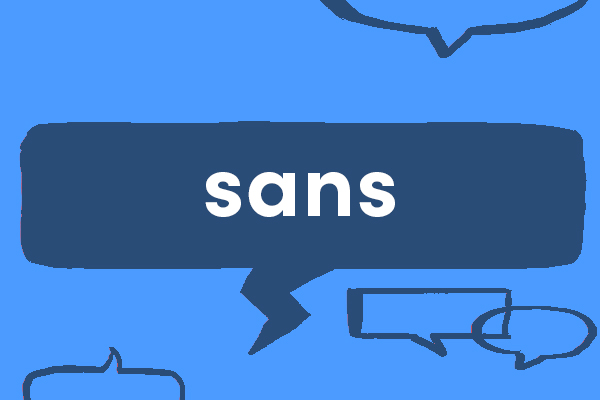In today’s French Word of the Week blog, we’re looking at the word sans. Before we get into the details of its meaning and use, take a listen to the audio clip for its pronunciation:
function playAudio(url) { new Audio(url).play(); }While this word is pretty short and sweet, it’s very useful when learning French. You’ll encounter it quite frequently, used in different ways.
In terms of its translation, sans means without in English. Now let’s zoom into the grammar. Sans is a preposition in French. If you need some more information on what exactly this means, we recommend checking out our Easy Learning French Grammar page on how to use prepositions.
Now it’s time to look at a few examples of sans in action:
La prochaine fois, je viendrai vous rendre visite sans mon mari. I’ll come to visit you without my husband next time.
La danse, c’est sa passion. Elle ne pourrait pas vivre sans danser ! Dance is her passion. She couldn’t live without dancing!
Vu que Paul va arriver en retard, on commence la réunion sans lui. Seeing as how Paul is going to be late, let’s start the meeting without him.
Je dois finir mes devoirs sans calculatrice. I have to finish my homework without a calculator.
Si tu as besoin d’aide, tu peux m’appeler sans hésiter. If you need help, you can call me without any hesitation.
C’est sans importance. It’s not important. / It doesn’t matter.
sans doute without a doubt
être sans emploi to be without a job; to be unemployed
sans cesse non-stop; endlessly
Vous travailliez sans cesse depuis lundi. You’ve been working non-stop since Monday.
When translating from French to English, something interesting to note about the use of sans is that your translation might sound more natural with the English suffixes -less or -free, rather than the word without. While there’s no set rule on this, it’s more about translating what feels correct in English. French will use sans in either situation, there is no suffix for -less or -free.
Here are a few common examples:
être sans logement to be homeless
sans effort effortless
sans espoir hopeless
une bière sans alcool alcohol-free beer
le paiement sans contact contactless payment
Je n’aime pas les boissons sans sucre. I don’t like sugar-free drinks.
Another week, another French word in your vocabulary. We hope that learning the language starts to feel effortless soon enough, and you’ll be able to keep it up without too much help from our blogs!
Written by Holly Tarbet, freelance copywriter and editor.
All opinions expressed on this blog are those of the individual writers, and do not necessarily reflect the opinions or policies of Collins, or its parent company, HarperCollins.



